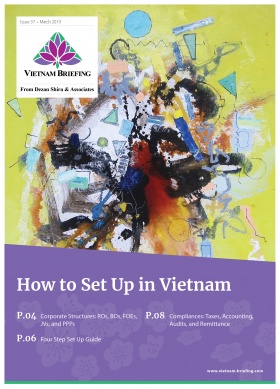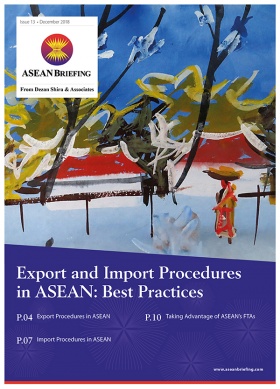US-China Trade War “Likely to Tip Some China-Based American Manufacturers to Vietnam”
With China having released a whole raft of tariffs on US products 48 hours ago, the repercussions and likely response from Washington has sent reverberations across the US manufacturing industry. While much of the mainstream media commentary has focused on the impact on the US economy and its farmers, there is still a sizeable group of North American manufacturers who have established facilities in China and Asia who have also been looking at the developing spat with China with some alarm.
Dezan Shira & Associates maintains a liaison office in the United States, headed up by Dustin Daugherty, who himself has spent many years with the practice in both China and Vietnam. According to Daugherty, American businesses that have an interest in China fall into the following categories when it comes to the US-China conflict:
- Those in denial, or who believe the storm will pass soon and don’t want to invest the resources or time in devising alternate supply chain strategies;
- Those who were already concerned with the cost of doing business in China, and for whom when the trade war began led them to seek to supplement their operations with a China Plus One strategy by moving at least part of their sourcing or processing, or even in-house manufacturing operations to South or Southeast Asian countries, such as Vietnam;
- Those who have been sitting on the fence, wanting to hold out from making a move out of China for as long as possible, hoping the conflict will end but overall unsure about how it will play out.
This latest escalation is most relevant for the third group. Following the G20 summit late last year when a “truce” was called, a lot of American businesses felt that the worst of the tariffs on either side had already come into force, and the 25 percent rate that was scheduled for some products for 2019 would be delayed further or cancelled. Now that it is apparent that the increased rate will indeed come into effect, this group will likely be pushed over the edge. That means they will now finally bite the bullet by either exploring direct tariff mitigation strategies, such as reclassification or the first sale rule, or by looking for help in moving parts of their supply chain into other jurisdictions like Vietnam, Thailand, or India.
Daugherty elaborates: “While it is extremely difficult to forecast political events both on the US and China sides, the conflict so far has shown that China, while not wanting escalation, is not afraid of retaliation against US moves. My opinion is that US businesses should expect things to get worse before they get better. Any firms holding out should not be banking on tariffs being removed or getting lucky through possible exemptions or HS code reclassification.
While in the rare situation these can be beneficial, most companies will not qualify. Thus any US firms that have a China exposure, which has already been damaged by tariffs should absolutely be looking at what can be done to augment the current supply chain and shift themselves to a lower cost, lower tariff jurisdiction. Frankly I think some manufacturers and sourcing firms should view this crisis as an opportunity to move some lower value-add activities/products out of China and into a lower cost country whose long term production economics make far more sense than China’s.”
This evaluation appears to manifest itself within the firm’s own 2019 figures to date. Chris Devonshire-Ellis, the practice Chairman, has just completed the firm’s spring overview and has figures available from January-April in terms of foreign investors and where they are headed. “Interestingly, US foreign direct investment into China is holding steady this year to date”, he says “showing that China is still a major draw for American manufacturers. But these are looking at primarily the domestic China market as well as using China’s free trade agreements with the likes of ASEAN to generate a foothold into the Asian market overall.
However, we do see an increase in existing US investors also now choosing to set up a manufacturing presence in Vietnam. They are not necessarily leaving China, but are shifting part of their production to Vietnam. These businesses are evolving and the US-China trade war is accelerating that trend. In terms of Vietnam alternatives, we are showing high growth in Indonesia, Philippines, and India. The first two, like Vietnam, are members of ASEAN with similar trade policies and free trade agreements with China, while India is still to go through some development processes with their own elections falling due and some disputes of their own with the United States over market access issues. If these are resolved then we will see a greater amount of interest there. But for now the China plus one strategy is centered on Vietnam, Indonesia, and the Philippines.”
About Us
Dezan Shira & Associates have over 25 years worth of experience in assisting foreign investors in Asia, and have a network of offices across China, India, the ASEAN nations, Russia, and Europe. For sourcing assistance please email us at tariffs@dezshira.com or visit us at www.dezshira.com.
- Previous Article Non-Financial FIEs in China Saw Revenues Grow by 19.8% in 2018. What Does this Mean?
- Next Article Why Vietnam is Overtaking China as a Destination for US Export Manufacturing








